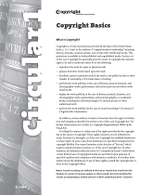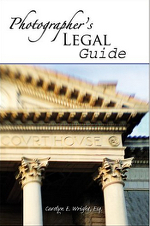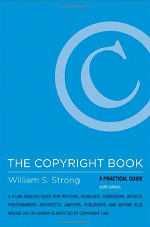Here are some additional sources of information.
Recommended for Photographers:
 The U.S. Copyright Office is a primary source of information. The Copyright Office’s Circular 1 on Copyright Basics (pdf) provides a 12-page general overview of the subject , and their Frequently Asked Questions About Copyright provides details about the registration process and services provided by the Copyright Office.
The U.S. Copyright Office is a primary source of information. The Copyright Office’s Circular 1 on Copyright Basics (pdf) provides a 12-page general overview of the subject , and their Frequently Asked Questions About Copyright provides details about the registration process and services provided by the Copyright Office.
 The Photographer’s Guide to Copyright is a free 37-page booklet published by PhotoShelter and the American Society of Media Photographers. It is available as a free pdf. It goes into greater detail about some of the same questions addressed in this article, and much of the content is in the form of interviews with professional photographers. The booklet provides insights into how to address infringement, and how professional photographers can make copyright registration part of their everyday workflow.
The Photographer’s Guide to Copyright is a free 37-page booklet published by PhotoShelter and the American Society of Media Photographers. It is available as a free pdf. It goes into greater detail about some of the same questions addressed in this article, and much of the content is in the form of interviews with professional photographers. The booklet provides insights into how to address infringement, and how professional photographers can make copyright registration part of their everyday workflow.
 The organization New Media Rights has an excellent collection of legal and how-to guides for independent creators, Internet users, nonprofits, and small businesses.
The organization New Media Rights has an excellent collection of legal and how-to guides for independent creators, Internet users, nonprofits, and small businesses.
Photographer’s Legal Guide is a 116-page book written by attorney Carolyn E. Wright and published by her law firm. The book is about more than just copyright, offering information for professional photographers (or amateurs who aspire to be professionals) on types of business entities, contracts, marketing, insurance, model releases and privacy rights. The chapter on copyright is 33 pages long and is an excellent short practical guide.
Recommended for General Readers:
 The Copyright Book: A Practical Guide, by William S. Strong, is a detailed handbook written in clear, compelling prose by an intellectual property attorney, for artists, writers, lawyers, publishers, and anyone else who is affected by copyright. The book’s careful documentation will satisfy lawyers and scholars, and its plain English style makes it accessible to all. Highly recommended for anyone seeking a deeper understanding of copyright law.
The Copyright Book: A Practical Guide, by William S. Strong, is a detailed handbook written in clear, compelling prose by an intellectual property attorney, for artists, writers, lawyers, publishers, and anyone else who is affected by copyright. The book’s careful documentation will satisfy lawyers and scholars, and its plain English style makes it accessible to all. Highly recommended for anyone seeking a deeper understanding of copyright law.
 Free Culture, by Lawrence Lessig (also available as a free download) is a valuable introduction to the ideas of the founder of the Creative Commons organization. Free Culture includes a brief history of corporations stifling innovation, and an account of Lessig’s arguing of Eldred v. Ashcroft before the U.S. Supreme Court, asserting that the Sonny Bono Copyright Term Extension Act was unconstitutional. Lessig describes ways that the expansion of copyright law has made our culture less free, and he offers solutions to improve the copyright system.
Free Culture, by Lawrence Lessig (also available as a free download) is a valuable introduction to the ideas of the founder of the Creative Commons organization. Free Culture includes a brief history of corporations stifling innovation, and an account of Lessig’s arguing of Eldred v. Ashcroft before the U.S. Supreme Court, asserting that the Sonny Bono Copyright Term Extension Act was unconstitutional. Lessig describes ways that the expansion of copyright law has made our culture less free, and he offers solutions to improve the copyright system.
Recommended for Law Students and Lawyers:
 Understanding Copyright Law, by Marshall A. Leaffer, is a legal hornbook, useful mainly to law students and attorneys. Like all the books in the Understanding series, this volume provides a comprehensive explanation of the law in as clear and concise a manner as possible, with extensive citations to case law.
Understanding Copyright Law, by Marshall A. Leaffer, is a legal hornbook, useful mainly to law students and attorneys. Like all the books in the Understanding series, this volume provides a comprehensive explanation of the law in as clear and concise a manner as possible, with extensive citations to case law.
 Attorneys looking for a practice guide to copyright law may want to check out An Associate’s Guide to the Practice of Copyright Law, by Meaghan H. Kent and Joshua J. Kaufman, which covers copyright registration, transfers and licenses, DMCA takedown notices, demand letters and litigation.
Attorneys looking for a practice guide to copyright law may want to check out An Associate’s Guide to the Practice of Copyright Law, by Meaghan H. Kent and Joshua J. Kaufman, which covers copyright registration, transfers and licenses, DMCA takedown notices, demand letters and litigation.
If you wish to gain a deeper understanding of copyright law, including the theories that underlie current policy, I highly recommend the CopyrightX series of lectures by Harvard Law professor Terry Fisher. The introductory lecture is embedded below.